India
Plastic Waste (Management and Handling) Rules (2011)
Posted on 28 Jul, 2011 08:21 AMThis document on the Ministry of Environment and Forests site includes the Plastic Waste (Management and Handling) Rules replaces the earlier Recycled Plastics Manufacture and Usage Rules,1999 (amended in 2003).
Managing drinking water security - A handbook for Gram Panchayats by the Department of Drinking Water Supply (MoRD)
Posted on 27 Jul, 2011 10:03 PM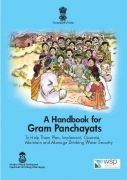 This handbook for Gram Panchayats has been prepared by the Water and Sanitation Program (World Bank) for the Department of Drinking Water Supply, Ministry of Rural Development, Government of India.
This handbook for Gram Panchayats has been prepared by the Water and Sanitation Program (World Bank) for the Department of Drinking Water Supply, Ministry of Rural Development, Government of India.
The Department of Drinking Water Supply (DDWS) launched the National Rural Drinking Water Program (NRDWP) in April, 2009. The NRDWP builds on experiences gained through past efforts by many stakeholders and brings all existing rural drinking water initiatives under a single program. The focus of the NRDWP is to ensure drinking water security for all rural citizens in India. Drinking water security means providing every rural person with enough safe water for drinking, cooking and other domestic needs at all times and in all situations, including periods of drought and flood and for livestock.
Perspectives on poverty in India - Stylized facts from survey data – A report by World Bank
Posted on 26 Jul, 2011 04:38 PM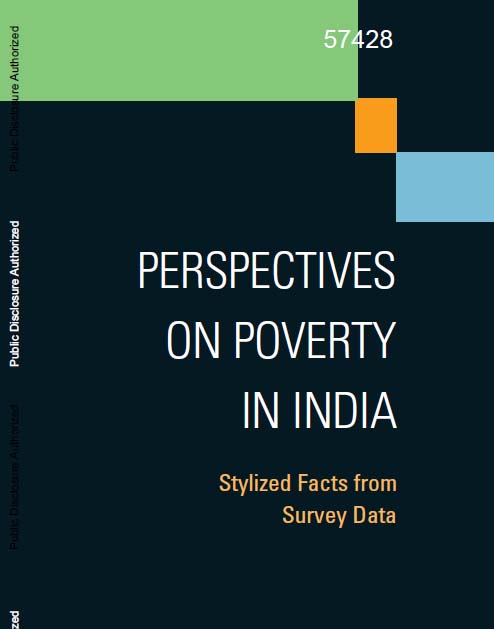 It produces a diagnosis of the broad nature of the poverty problem and its trends in India, focusing on both consumption poverty and human development outcomes.
It produces a diagnosis of the broad nature of the poverty problem and its trends in India, focusing on both consumption poverty and human development outcomes.
It also includes attention in greater depth to three pathways important to inclusive growth and poverty reduction harnessing the potential of urban growth to stimulate rural-based poverty reduction, rural diversification away from agriculture, and tackling social exclusion.
The political economy of sanitation - How can we increase investment and improve service for the poor? – A report by Water and Sanitation Program
Posted on 26 Jul, 2011 02:53 PM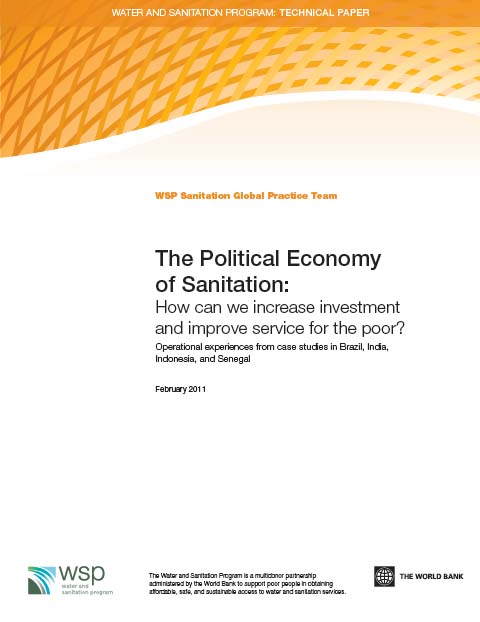 This global study attempts systematically to understand and thus help practitioners manage the political economy of pro-poor sanitation investments and service provision.
This global study attempts systematically to understand and thus help practitioners manage the political economy of pro-poor sanitation investments and service provision.
It aims to provide practical advice to multi-lateral agencies and sanitation practitioners to help them better manage stakeholder relations and effectively maneuver within the complex institutional relationships of the sanitation sector in order to enhance the design, implementation, and effectiveness of operations that provide pro-poor sanitation investments and services. The ultimate goal is to improve health and hygiene outcomes.
This study follows current approaches to political economy - interdisciplinary inquiry drawing upon social and political theory and economic principles - to understand how political actors, institutions, and economic processes influence each other. This study’s conceptual framework combines a diagnostic component with a typology of actions to help translate analytical findings into more effective support to operations and investments.
Guidelines of the Central Rural Sanitation Programme and Total Sanitation Campaign by the Department of Drinking Water and Sanitation (2011)
Posted on 25 Jul, 2011 07:30 PMThis document by the Department of Drinking Water and Sanitation deals with the guidelines of the Central Rural Sanitation Programme (CRSP) and Total Sanitation Campaign (TSC). India’s first nationwide programme of rural sanitation, the CRSP was launched in 1986, while TSC was launched in 1999 with the aim of ending open defecation.
Public support to food security in India, Brazil and South Africa – Elements for a policy dialogue – A working paper by International Policy Centre for Inclusive Growth
Posted on 21 Jul, 2011 08:52 AM Together, India, Brazil and South Africa have about 20 per cent of the world’s population. Although the three countries have demonstrated the potential for transformative development in the South, their experience has been marked by key challenges such as relatively high levels of poverty, inequality and food insecurity, problems that persist for significant numbers of people.
Together, India, Brazil and South Africa have about 20 per cent of the world’s population. Although the three countries have demonstrated the potential for transformative development in the South, their experience has been marked by key challenges such as relatively high levels of poverty, inequality and food insecurity, problems that persist for significant numbers of people.
There is a potential to build a network of academics and experts from Brazil, India and South Africa, and food security is among the themes of great interest. This paper seeks to contribute to this process by examining pertinent elements of policy dialogue. As regards food security, each of these countries has developed conceptions and orientations that guide their policy agendas. They include distinctive treatments of several multi-dimensional strategies, multi-stakeholder arrangements and rights-based approaches.
India must prepare for future growth by planning a low-water economy - Article in YaleGlobal Online by Rohini Nilekani
Posted on 19 Jul, 2011 12:37 PMArticle and Image courtesy: YaleGlobal Online
Author: Rohini Nilekani
India and China account for one third of the world’s population; each consumes more freshwater than other nations. Per inhabitant per year, though, India uses less than half what’s used in the US, China uses less than one third. This YaleGlobal series examines India and China’s water use, their expectations for rising demand and recognition that shortages will disrupt economic progress.
The Planning Commission of India repeatedly warns that water will become a more serious issue than land or energy for India in years to come, points out Rohini Nilekani, in the second article of the series. India’s transition from an economy based on agriculture to a mixed one, with water use controlled by states rather than the federal constitution, already leads to conflicts. She urges planning for a low-water economy. Good governance and regulatory frameworks can prevent pollution and waste, while encouraging efficiency, reliable and fair allocation, and wise consumer choices.
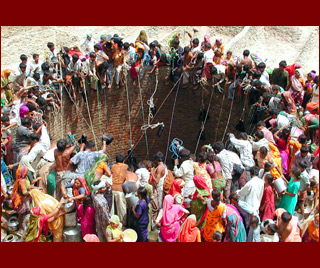 Thirsty earth: Indian villagers in Gujarat gather to draw water from a well
Thirsty earth: Indian villagers in Gujarat gather to draw water from a well
Impact of climate change on extreme rainfall events and flood risk in India – A paper in Journal of Earth System Science
Posted on 18 Jul, 2011 06:27 AMThe occurrence of exceptionally heavy rainfall events and associated flash floods in many areas during recent years prompted the researchers to study long-term changes in extreme rainfall over India.
Maps generated from the integration of water level data of Central Ground Water Board and State Ground Water Board
Posted on 17 Jul, 2011 03:49 PMThe CGWB under the Ministry of Water Resources, Government of India, is the national apex agency entrusted with the responsibilities of providing scientific inputs for management, exploration, monitoring, assessment, augmentation and regulation of ground water resources of the country.
Evaluating household water treatment options
Posted on 17 Jul, 2011 02:11 PM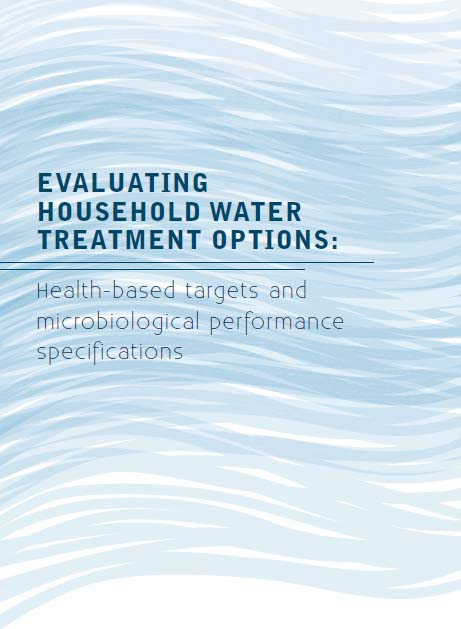 This document by the World Health Organisation, for the first time, sets forth global criteria to evaluate whether a household water treatment option reduces waterborne pathogens sufficiently to protect health. Through use of a risk-based framework and by emphasizing the philosophy of incremental improvement, it is intended to provide implementers and policy-makers with an evidence-based and pragmatic approach to select options suited to local conditions.
This document by the World Health Organisation, for the first time, sets forth global criteria to evaluate whether a household water treatment option reduces waterborne pathogens sufficiently to protect health. Through use of a risk-based framework and by emphasizing the philosophy of incremental improvement, it is intended to provide implementers and policy-makers with an evidence-based and pragmatic approach to select options suited to local conditions.
Household water treatment interventions may play an important role in protecting public health where existing water sources, including those delivered via a piped network or other improved sources, are untreated, are not treated properly or become contaminated during distribution or storage. Household water treatment applications are a range of technologies, devices or methods employed for the purposes of treating water at the household level or at the point of use in other settings, such as schools, health-care facilities and other community locations. Point-of-use water treatment is another term used for household water treatment.